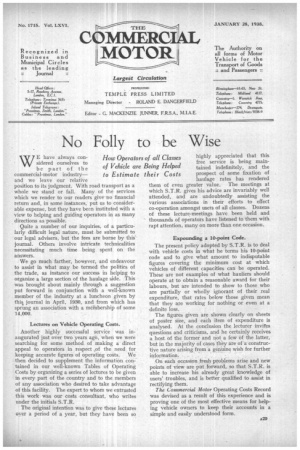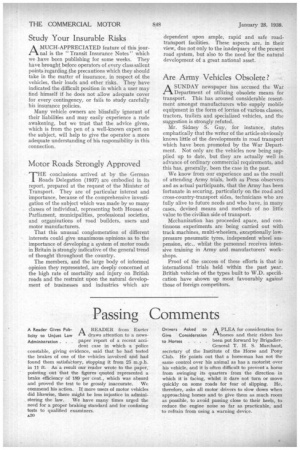No Folly to be Wise
Page 1

Page 2

If you've noticed an error in this article please click here to report it so we can fix it.
WE have always considered ourselves to be part of the commercial-motor industry— and we leave our relative position to its judgment. With road transport as a whole we stand or fall. Many of the services which we render to our readers give--no financial return and, in some instances, put us to considerable expense, but they have been instituted with a view to helping and guiding operators in as many directions as possible.
Quite a number of our inquiries, of a particularly difficult legal nature, must be submitted to our legal advisers, but the fees are borne by this' journal. Others involve intricate technicalities necessitating much time being spent on the answers.
We go much farther, however, and endeavour to assist in what may be termed the politics of the trade, as instance our success in helping to organize a large section of the haulage side. This was brought about mainly through a suggestion put forward in conjunction with a well-known member of the industry at a luncheon given by this. journal in April, 1930, and from which has sprung an association with a membership of some
14,000.
Lectures on Vehicle Operating Costs.
Another highly successful service was inaugurated just over two years ago, when we were searching for some method, of making a direct appeal to operators in respect ,.of the need for keeping accurate figures of operating costs. We then decided to supplement the information con' tained in our well-known Tables of Operating Costs by organizing a series of lectures to be given in every part of the country and to the members of any association who desired to take advantage of this facility. The expert to whom we entrusted this work was our costs consultant, who writes under the initials S.T.R.
The original intention was to give these lectures over a period of a year, but they have been so highly appreciated that this free service is being maintained indefinitely, and the prospect of some fixation of haulage rates has rendered them of even greater value. The meetings at which S.T.R. gives his advice are invariably well attended, and are undoubtedly assisting the various associations in their efforts to effect co-operation amongst users of all classes. Dozens of these lecture-meetings have been held and thousands of operators have listened to them with rapt attention, many on more than one occasion.
Expounding a 10-point Code.
The present policy adopted by S.T.R. is to deal with vehicle costs in what he terms his 10-po4nt code and to give what amount to indisputable figures covering the minimum cost at which vehicles of different capacities can be operated. These are not examples of what hauliers should operate at to obtain a reasonable award for their labours, but are intended to show to those who are partially or wholly ignorant of their real expenditure, that rates below those given mean that they are working for nothing or even at a definite loss.
The figures given are shown clearly on sheets of poster size, and each item of expenditure is analysed. At the conclusion the lecturer invites questions and criticisms, and he certainly receives a host of the former and not a few of the latter, but in the majority of cases 'they are of :a constructive nature arising from -a genuine wish for further information.
On each occasion fresh problems arise and new points of view are put forward, so that S.T.R. is able to increase his already great knowledge of users' troubles, and is better qualified to assist in rectifying them.
The Commercial Motor Operating Costs Record was devised as a result of this experience and is proving one of the most effective means for helping vehicle owners to keep their accounts in a simple and easily understood form.
Study Your Insurable Risks
.1-1 A MUCH-APPRECIATED feature of this journal is the "Transit Insurance Notes" which we have been publishing for some weeks. They have brought before operators of every class salient points regarding the precautions which they should take in the matter of insurance, in respect of the vehicles, their loads and other risks. They have indicated the difficult position in which a user may find himself if he does not allow adequate cover for every contingency, or fails to study carefully his insurance policies.
Many vehicle owners are blissfully ignorant of their liabilities and may easily experience a rude awakening, but we trust that the advice given, which is from the pen of a well-known expert on the subject, will help to give the operator a more adequate understanding of his responsibility in this connection.
Motor Roads Strongly Approved
THE conclusions arrived at by the German Roads Delegation (1937) are embodied in its report, prepared at the request of the Minister of Transport. They are of particular interest and importance, because of the comprehensive investigation of the subject which was made by so many classes of individual, representing both Houses of Parliament, municipalities, professional societies, and organizations of road builders, users and motor manufacturers.
That this unusual conglomeration of different interests could give unanimous opinions as to the importance of developing a system of motor roads in Britain is strongly indicative of the general trend of thought throughout the country.
The members, and the large body of informed opinion they represented, are deeply concerned at the high rate of mortality and injury on British roads and the restraint upon the natural development of businesses and industries which are dependent upon ample, rapid and safe roadtransport facilities. These aspects are, in their view, due not only to the inadequacy of the present road system, but also to the need for the natural development of a great national asset.
Are Army Vehicles Obsolete?
ASUNDAY newspaper has accused the War Department of utilizing obsolete means for transport. This has aroused considerable resentment amongst manufacturers who supply mobile equipment in the form of lorries of various classes, tractors, trailers and specialized vehicles, and the suggestion is strongly refuted.
Mr. Sidney S. Guy, for instance, states emphatically that the writer of the article obviously knows little of the developments in road transport which have been promoted by the War Department. Not only are the vehicles now being supplied up to date, but they are actually well in advance of ordinary commercial requirements, and this has, generally, been the case in the past.
We know from our experience and as the result of attending Army trials, both as Press observers and as actual participants, that the Army has been fortunate in securing, particularly on the road and cross-country-transport sides, technicians who are fully alive to future needs and who have, in many cases, devised means and methods of no little value to the civilian side of transport.
Mechanization has proceeded apace, and continuous experiments are being carried out with track machines, multi-wheelers, exceptionally lowpressure pneumatic tyres, independent wheel suspension, etc., whilst the personnel receives intensive training in Army and manufacturers' workshops.
Proof of the success of these efforts is that in international trials held within the past year, British vehicles of the types built to W.D. specification have shown up most favourably against those of foreign competitors.
































